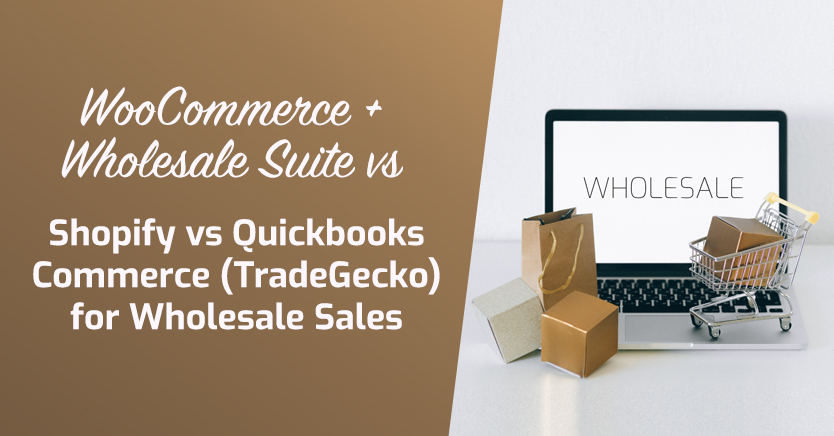
Not all e-commerce platforms offer the same features and few of them are a good match for wholesale operations. In fact, there’s only a handful of tools and e-commerce services that we’d recommend if you want to target wholesale customers. Among them, we have WooCommerce + Wholesale Suite vs Shopify vs QuickBooks Commerce.
In this article, we’re going to compare the Wholesale Suite vs Shopify vs QuickBooks Commerce. We’ll discuss how each platform works and what features they offer. Armed with that information, you’ll be ready to launch a wholesale online store that offers a fantastic experience for your customers. Let’s get to it!
Why You Need a Dedicated Wholesale Solution for Your Store
Wholesale stores operate in a completely different way than retail operations. When you visit a regular online store, you can buy a single product and pay your bill in a matter of minutes. You don’t even need to have direct interaction with anyone throughout that entire process:
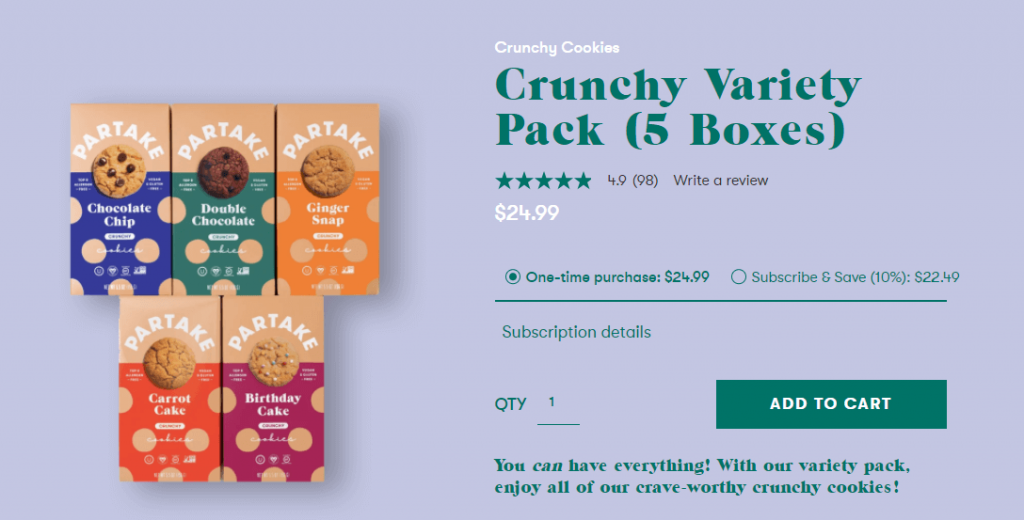
If you’re a wholesale customer, you’re not going to buy one product at a time, though. You might need to purchase hundreds or thousands of items. That requires the store to cater to your needs, which may include:
- Submitting invoices that you can pay outside of regular payment processors
- Arranging shipments for your warehouses, stores, or other destinations
- Discussing any customization needs that you might have for the products that you purchase
Wholesale stores operate more as Business-to-Business (B2B) enterprises than as regular online shops. B2B operations require unique features and most online e-commerce platforms aren’t designed to handle that kind of operation. If you’re planning on setting up a wholesale store, you’ll need to use the right tools for the job.
WooCommerce + Wholesale Suite vs Shopify vs QuickBooks Commerce
All three of these services and tools will enable you to sell products wholesale online. However, not every solution in this list is optimized for that purpose. We’ll discuss each platform’s strengths and weakness below, so keep reading.
Shopify

Shopify has a lot going for it. It’s one of the most popular e-commerce platforms in the world and it makes it easy for people without any development experience to launch their own stores. Its primary value proposition is that it enables individuals to set up simple stores that work without too much fuss.
That’s not to say that Shopify only works for small stores, though. Plenty of big businesses use Shopify to power their e-commerce operations, including Sephora and Tesla:
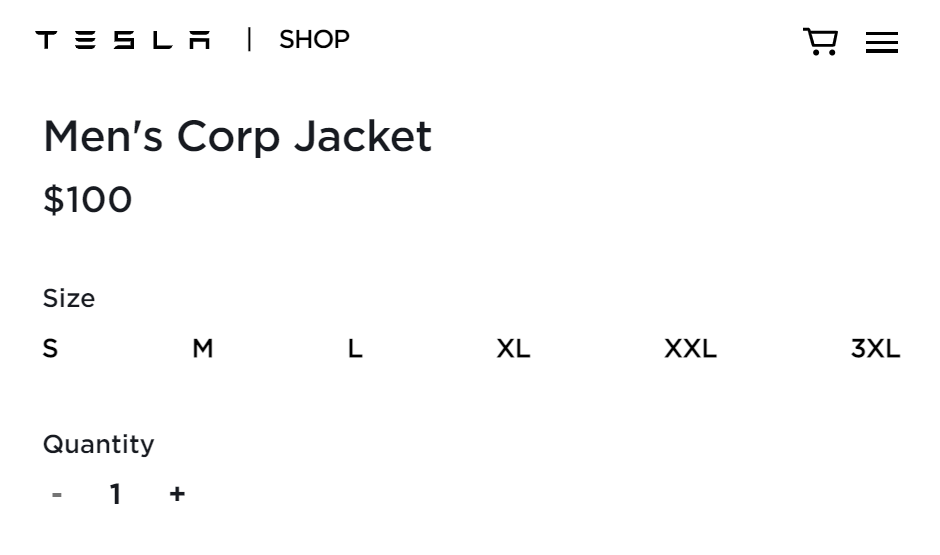
It is highly customizable and you can augment the platform’s functionality using ‘apps’ (or extensions). Thanks to Shopify’s popularity, it integrates with a broad range of third-party platforms and services:
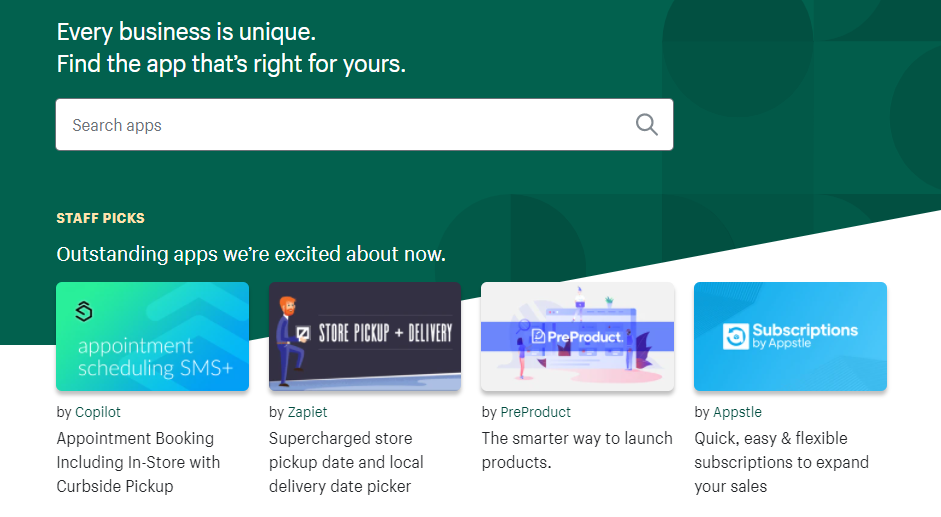
Although Shopify can adapt itself to a lot of situations, the platform’s core functionality isn’t well suited for wholesale stores. The entire experience is designed around retail customers which means you’d need to set up a whole lot of apps (at extra cost) to make it work for wholesaling.
To give you an example, there’s a Shopify app called Wholesale Custom Pricing that you can use to create wholesale user roles and discount products for them. However, that same app limits the number of roles that you can set up and even how many products you can discount:
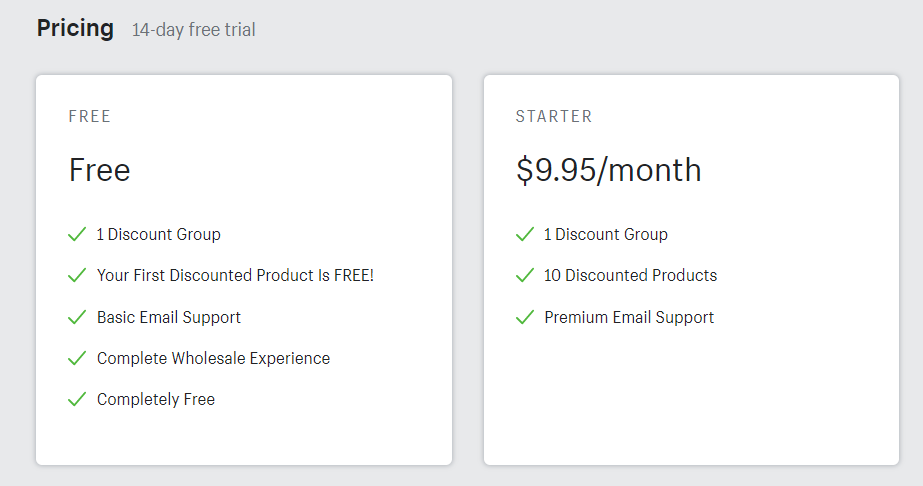
Most Shopify wholesale apps work on a subscription basis with limited functionality for each plan. That means to get a fully working store with hundreds of products with special pricing, you might need to pay for an expensive subscription.
QuickBooks Commerce (UPDATE: Quickbooks is shutting this product down!)
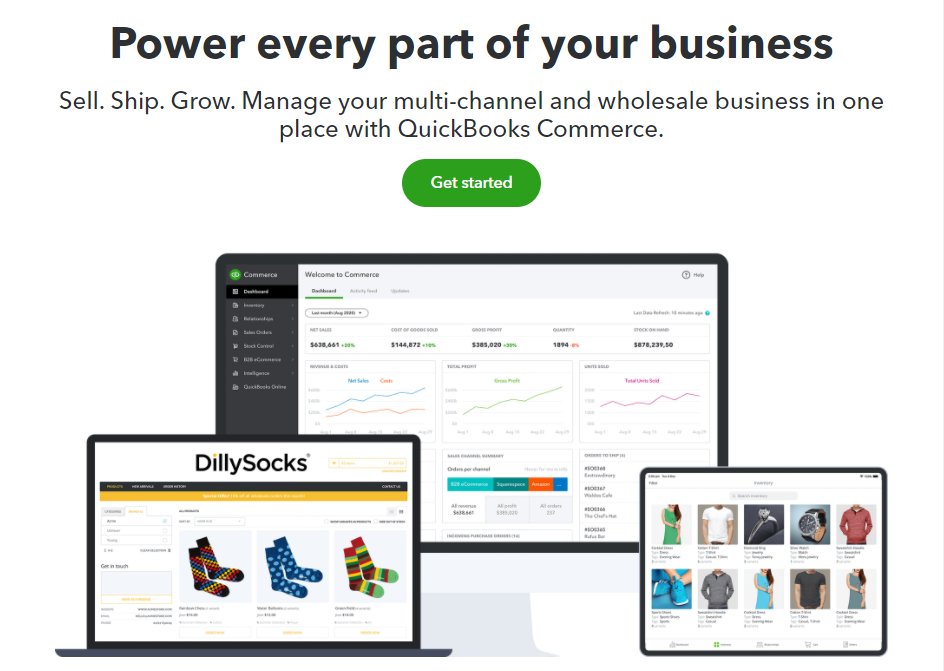
Update: Quickbooks is shutting Quickbooks Commerce (formerly TradeGecko) down. We do not recommend you use this product.
You probably know QuickBooks as just an accounting service. However, in 2020 QuickBooks acquired a company known as TradeGecko, which provided inventory and order management software. One thing TradeGecko was missing was sales functionality. At least, that is until it was rebranded as QuickBooks Commerce.
QuickBooks Commerce is geared towards B2B operations and it includes features such as automation workflows, inventory management, in-depth reporting, and more. Most importantly, QuickBooks support wholesale operations:

Another advantage of using QuickBooks Commerce is that it integrates with a lot of third-party platforms. Among those platforms, you have Shopify, WooCommerce, Fulfillment by Amazon, and more. If you combine it with Shopify, for example, you get both retail and wholesaling capabilities.
All of that comes at a cost, though. QuickBooks Commerce works on a subscription basis and its basic plans are very limited as far as order quantities go. To give you an example, QuickBooks Commerce Founder plan costs $39 per month (billed annually) and it only supports up to ten sales orders per month:
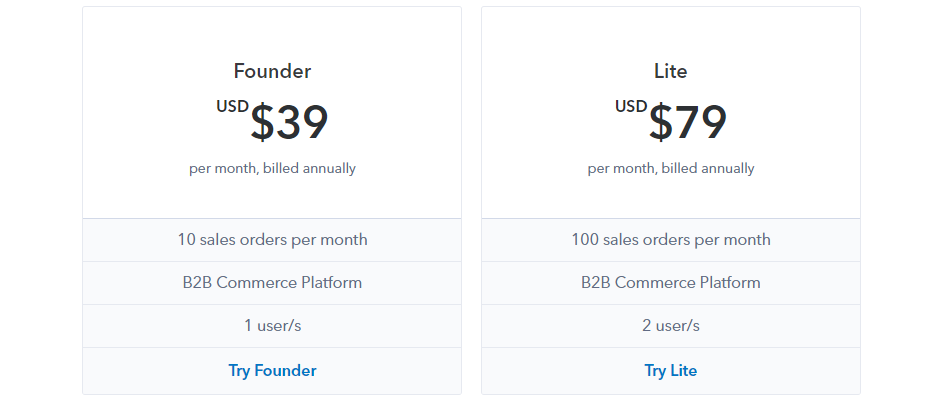
If you’re regularly dealing with hundreds of sales orders per month, you’ll end up paying for an expensive subscription just for that privilege. Moreover, QuickBooks Commerce is still a service in its infancy and it hasn’t been long since it implemented sales functionality.
In practice, that means that selling wholesale using QuickBooks Commerce isn’t as smooth as it could be. If you’re going to use a wholesale solution, you might as well opt for one that works well out of the box.
WooCommerce + Wholesale Suite

WooCommerce is the most popular e-commerce plugin for WordPress, which in turn is the most popular Content Management System (CMS) in the world. That makes WooCommerce one of the top e-commerce solutions for businesses of all sizes.
One thing that WooCommerce is lacking out of the box, though, is wholesale functionality. The plugin is all about retail operations, so it needs a little fixing if you want to use it to set up a wholesale store. That’s where the Wholesale Suite comes in:
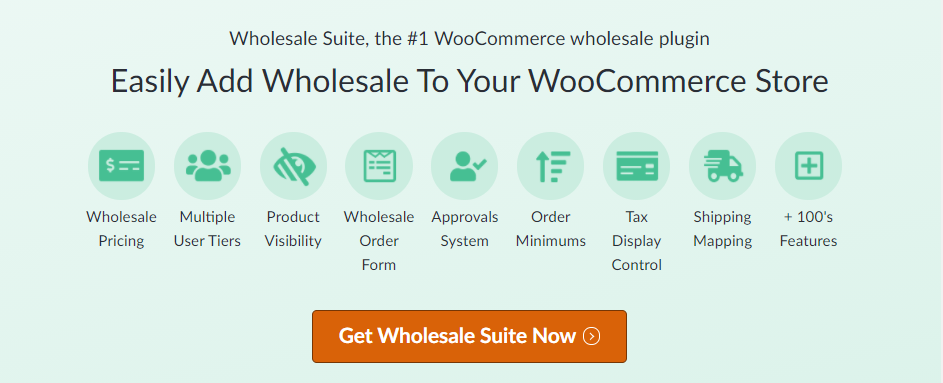
The Wholesale Suite is a collection of three plugins, each including different functionality for wholesale stores. Those three plugins are:
- WooCommerce Wholesale Prices Premium: This plugin enables you to set up multiple wholesale user roles and configure different product prices and discounts for each of them.
- Wholesale Order Form: Using this plugin you can create a streamlined wholesale order form that’s much more intuitive than WooCommerce’s default shop pages.
- Wholesale Lead Capture: This plugin enables you to create custom registration forms for wholesale users. You can then auto-approve registrations or go through them manually.
In theory, all that you need to transform WooCommerce into a wholesale solution is the Wholesale Prices Premium plugin. With it, you’ll be able to offer wholesale prices to specific customer user roles:
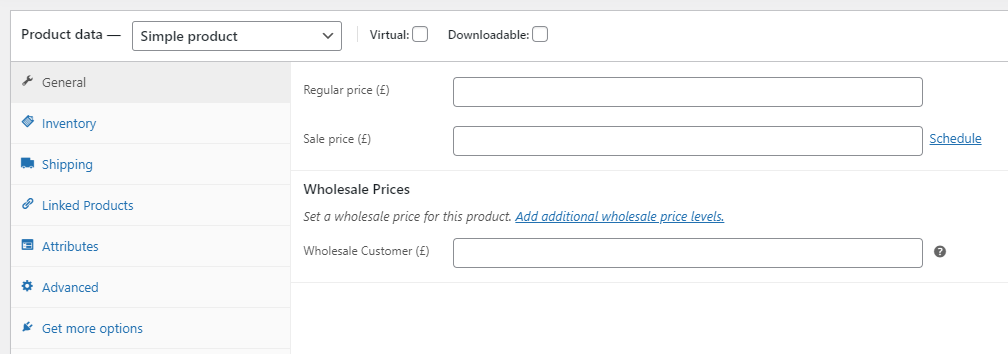
There’s even a free version of that plugin, which lets you set up a single wholesale customer user role and set custom prices for it. That means if you’re on a budget, you can launch a wholesale store without spending any money beyond your initial website setup costs.
The complete Wholesale Suite offers wholesale functionality that goes well beyond what you can find in Shopify or QuickBooks Commerce. More importantly, using WordPress means that you have full control over every aspect of your online store and you’re not locked into a third-party platform.
Finally, the Wholesale Suite doesn’t come in a subscription model. Instead, you pay a yearly licensing fee. That gives you access to the full suite of plugins, updates, and of course, support.
Conclusion
Which wholesale platform or tool you decide to use will have a massive impact on the experience that you can offer customers. Not every e-commerce tool is wholesale-friendly, which means that you might struggle to run your business efficiently.
If you’re looking for an intuitive, budget-friendly solution for wholesale stores, we recommend that you use WooCommerce + Wholesale Suite. By using WordPress, you’ll be able to host your online store anywhere that you want and customize it in any way that you see fit.
Do you have any questions about how to use WooCommerce + Wholesale Suite? Let’s talk about them in the comments section below!

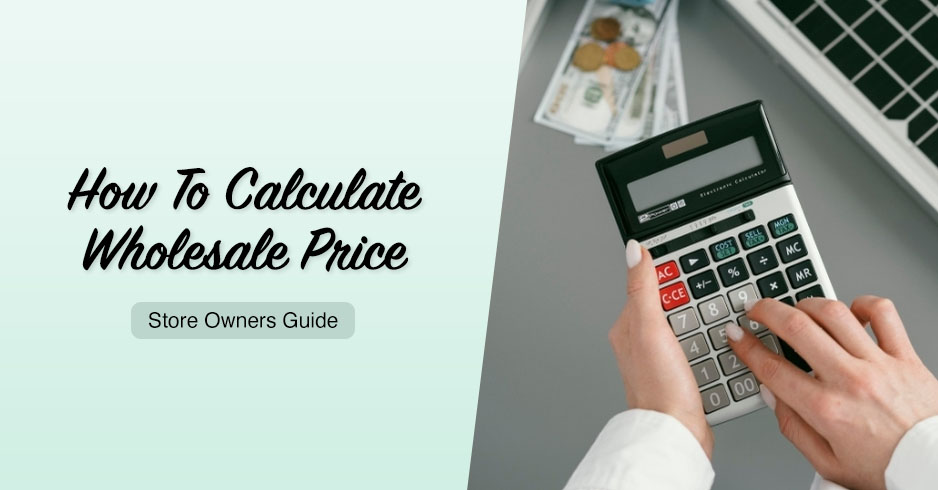


is there a plugin with which you are able to place backorders or orders with a supplier?
That functionality has quickbooks together with very intuitive way of ordering as well as an app for agents who are doing sales for brands. That I don’t see in Woocommerce with Wholesale suite.
Hi Jeske,
What you’re after is more on the inventory management side which WooCommerce only has basic facilities for (this is outside the scope for Wholesale Suite as it’s more to do with the sales side).
We are however building a solution for this called Inventoroo. Check it out here.
Cheers,
Josh